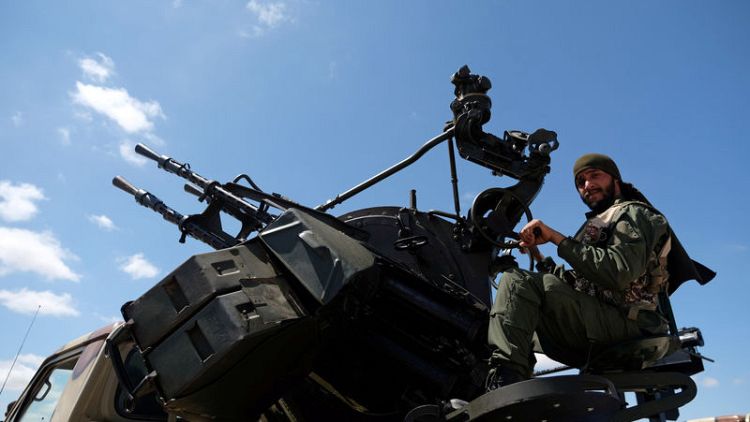TRIPOLI/BENGHAZI, Libya (Reuters) - Eastern Libyan forces carried out an air strike on the southern part of Tripoli on Sunday, escalating an operation to take the capital despite calls for a truce from the United Nations.
The Libyan National Army (LNA) force of Khalifa Haftar, which backs a parallel administration in the east, last week launched an advance on Tripoli in the west, the home to the internationally recognised government.
The offensive intensifies a power struggle that has fractured the oil and gas producer since the 2011 overthrow of Muammar Gaddafi.
The LNA claims to have reached the southern outskirts and taken its former international airport though the Tripoli military officials deny this.
A war plane carried out an air strike in the same area, a resident and eastern military source said. No more details were immediately available.
The U.N. mission to Libya (UNSMIL) called on Sunday for a truce for two hours in southern Tripoli to evacuate civilians and wounded, it said in a statement without giving details.
In another sign of the situation worsening on the ground, a contingent of U.S. forces supporting the U.S. Africa Command evacuated Libya for security reasons, a U.S. statement said. It gave no details.
Forces allied to the Tripoli government meanwhile announced its own operation called "Volcano of Anger" to defend the capital, a spokesman said, without giving details.
The offensive has taken the U.N. by surprise, undermining plan to find agreement on a road map for elections to resolve the protracted instability in Libya, transit point for refugees and migrants trekking across the Sahara with the objective of reaching Europe across the Mediterranean Sea to the north.
Haftar, 75, who casts himself as a foe of Islamist extremism but is viewed by opponents as a new dictator in the mould of Gaddafi, enjoys the backing of Egypt and the United Arab Emirates, which see him as a bulwark against Islamists and have supported him militarily, according to U.N. reports.
The UAE, however, have joined Western countries in expressing its deep concern about the fighting.
In the past, Haftar has struck deals with armed factions outside Tripoli to advance his forces. But gaining control of Tripoli - the ultimate prize for Haftar's eastern parallel government - would be far more complicated.
Armed groups allied to the Tripoli government have moved more machinegun-mounted pickup trucks from Misrata to Tripoli to defend it against Haftar's forces. The city is known for a spirit of resisting "old regime" figures, developed during 2011 when pro-Gaddafi forces besieged it for three months.
(Reporting by Ahmed Elumami and Ayman Alwarfalli; Writing by Ulf Laessing; Editing by Raissa Kasolowsky/Keith Weir)
